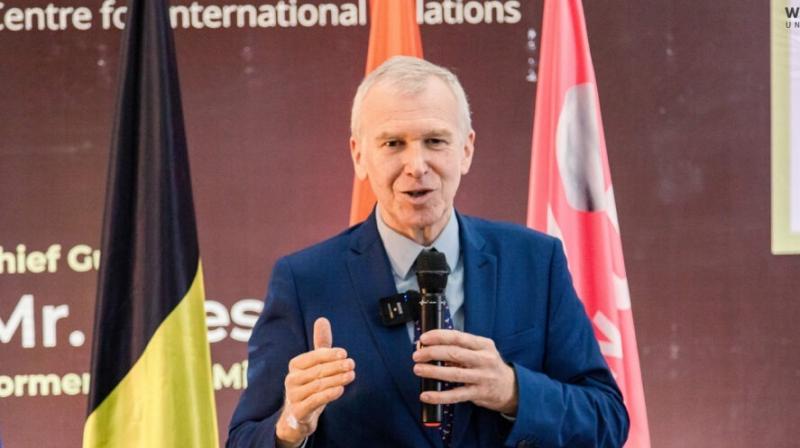Former Belgian Prime Minister Yves Leterme speaks at a conclave on “Strengthening Bilateral Relations between India and the European Union” held at Woxen University in Hyderabad.
Hyderabad: His Excellency Yves Leterme, former Prime Minister of Belgium, gave a persuasive speech at the International Conference on ‘India and the EU as Strategic Partners for the Future of Higher Education’ held at Woxen University. He highlighted the complexity of India-Belgium relations and the potential for enhanced cooperation between India and the European Union (EU).
In a 30-minute speech, the former prime minister reflected on Belgium’s unique identity, touched on the country’s linguistic and cultural diversity, pointed out similarities with India’s rich democratic tradition, and highlighted Belgium’s democratic He emphasized the importance of the tradition of principles. He said: “Dutch is spoken in the north of Belgium, French is spoken in the south, French is spoken in the center, including Brussels, and although there are a few Dutch people, the majority are English, Chinese, Hindi, and Arab. “We are a multinational, multicultural city.” ”
Moving on to the central theme of India-Belgium relations, the former prime minister emphasized bilateral trade between the two countries, pointing out the importance of sectors such as machinery, diamonds, pharmaceuticals and textiles. He acknowledged significant foreign direct investment from both countries, with companies such as Mittal and Tata playing a key role. Moving on to the broader topic of India-EU relations, he shared valuable insights on the EU’s institutional set-up. “The European Union, India, and the United States are the world’s largest democracies. As an emerging power, India is a democracy that upholds its values while addressing global challenges, and is committed to supporting balanced multilateral institutions and sustainable development. Equipped with an agenda of possible development goals, Woxen University is committed to “future generations upholding these principles,” he said.
Emphasizing the importance of India’s language proficiency, especially English, in promoting cultural, economic and diplomatic relations, he said: “I feel that we share some common values when it comes to governing,” he said. “To solve global challenges, think about the multilateral system. You (India) are also known as supporters of the SDG agenda. From a geopolitical perspective, you have great assets, viz. You have language skills. You can speak English, and that’s from a cultural exchange point of view.” “People-to-people exchanges, economic exchanges are very important assets besides democracy. You provide: skilled, well-trained, well-educated young people.”
The former Prime Minister touched on the four key areas of cooperation outlined by India and the EU – transport, energy, digital world and people-to-people connectivity, and emphasized the importance of educational exchanges. He proposed establishing an Erasmus-like program for Indian students and stressed the need for mutual learning through cultural and academic cooperation. “The first stage of EU-India cooperation is to work together and connect to foster good incentives and learn about each other. The Connectivity Partnership is a joint initiative between the EU and India with transport as a top priority. “We have decided to strengthen our investment in infrastructure to transport energy products and water, including several additions.” The second priority is to create an ecosystem for energy consumption. Efficient use of resources requires a lot of innovation and investment. The third area is the digital realm. We have to work together.” The EU needs natural resources in free market competition, so we need cooperation in the digital world. Cooperation between the EU and India will boost India’s unicorns and You can use cutting-edge technology to build more competition in the digital world. While emphasizing the importance of educational exchanges and tourism and seeking highly educated and skilled talent from India’s best management schools, India and the EU should also deepen cooperation on the geopolitical front. We need to solve problems together. We must resume agreements on free trade, investment protection and geopolitical issues.”
The former prime minister outlined the EU’s political and economic interests in strengthening ties with India and called for diversifying its geopolitical outlook to reduce tensions between the world’s major players. “We need labor. We need enough brainpower to compete in the field. But good cooperation between the EU and India will help us find alternatives and create breakthroughs with Indian unicorns in the future.” “I think it’s worth the effort to foster progress in this area.” “I think it’s worth the effort to encourage the participation of Indian companies to bring more competition in this area. “In the digital world, this means we’re working on the cutting edge, we’re working on issues like privacy protection, we’re trying to find out.” “It’s a good regulatory framework for artificial intelligence, and that’s where we can work together.” I think, and maybe we need to lower the level of regulation a little bit,” he said. He encouraged a focus on free trade and strengthening economic ties, and stressed the need for more competition beyond dominant players such as Amazon and Alibaba.
Speaking on the occasion, Vishal Kurma, CEO, Woxen University, said, “Europe’s aging population poses significant challenges for companies to find young talent with the right skill sets. As part of our strategic partnership with the EU, we will be able to resolve the same issue in the following ways.” Universities like Woxen achieve this by providing students with practical skills through advanced labs and innovative pedagogy in disruptive technologies such as artificial intelligence, data science, cybersecurity, and deep learning. It can open up new avenues for mutual synergy. These are at the core stages of innovation in the technology sector. ”
